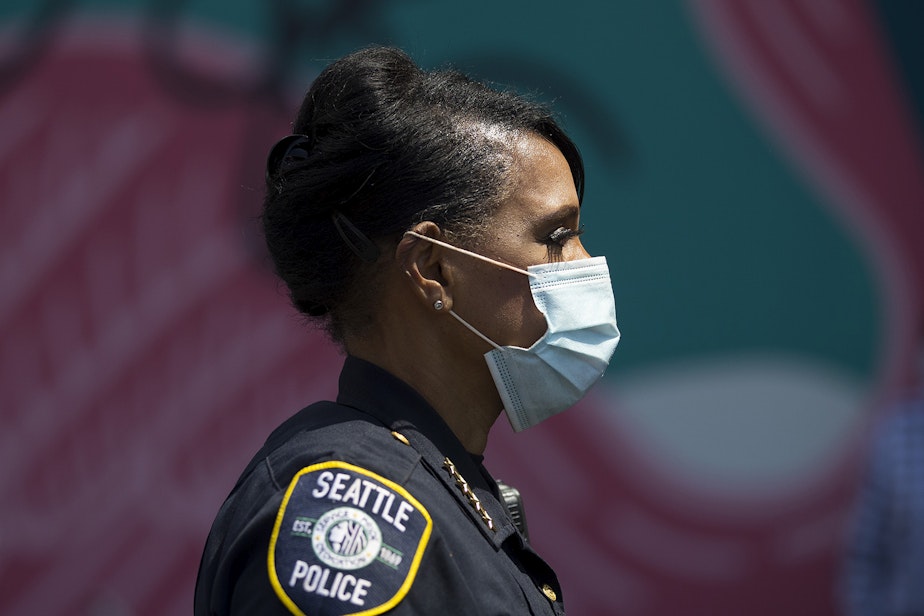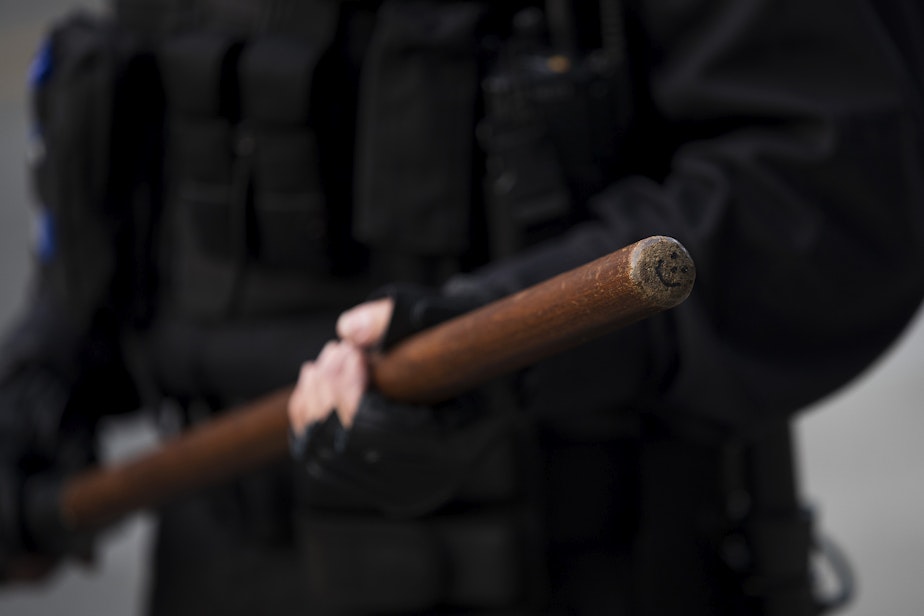Seattle police chief wants East Precinct back and defends tear gas. And says she wants change

Seattle Police Chief Carmen Best has become a lightning rod during the protests.
Best has begun press conferences condemning the “murder of George Floyd” by police, but then allowed her officers to unleash tear gas on protesters days after promising to stop.
In an interview with KUOW on Tuesday, Best said she was moved by the silent march on Friday and wants to see radical change in her department … but also said she wants East Precinct back, and that deep cuts to police are not necessary.
She also said she believes tear gas is an effective crowd management tool.
“If the City Council takes it away, we're back to batons,” she said, and that's a result she said would be "archaic" and she doesn't want.
Getting back East Precinct
After 10 days of demonstrations, Seattle police abandoned the East Precinct. It’s been more than a week, and the police haven’t been back, but Best said her officers intend to return.
“We want to make sure that the East Precinct, that we're not able to occupy right now, is a place of unity and reconciliation and community, and that officers are able to be occupy the building,” she said.
Read the transcript of Angela King's interview with Chief Carmen Best.
She does not believe the building should be turned into a community center, as protesters have asked.
“The officers need to be in the precinct responding to calls for service from the precinct,” Best said. “If there's a building for protesters that's available, then certainly I'm not opposed to that.”
Her main concern is that response times to 911 calls have increased, she said, by 3.5 times.
Sponsored
“It's an evolving process as we talk to the protesters and try to figure it out,” Best said. “These negotiations could take some time.”
She said she does not believe the building should be turned into a community center.
Defending tear gas
On Monday night, the City Council banned the use of tear gas by Seattle police, along with use of pepper spray and stun grenades. The council also banned the use of chokeholds.
Chief Best said studies show tear gas and pepper spray are more effective than old school tactics like batons. (Although Seattle Police do have batons.)
“While it is irritating, people don't usually end up with any type of serious injury, and we really wanted to avoid that,” Best said.

Any takers for mental health calls that go to police?
Seattle Police responded to roughly 17,000 crisis calls over a year and a half, Chief Best said.
“If some social service agency wants to take on those crisis calls for people in Seattle,” she said, she could have the police response.
Sponsored
Defunding the police
“The concern is can we provide better services, human services to people. And I think there's a way to do that without cutting fully the budget,” Chief Best said.
“But we're certainly open to how we might divest some of the responsibility of the police department to other agencies.
Watching the silent Black Lives Matter march
Best said she was moved by the Black Lives Matter silent march on Friday.
Sponsored
“It just was very clear to me that there's still a lot of hurt, and a lot of anger,” she said.
“As I was watching, I just realized we need to change, we need to do something different. And the policing will never be the same after this national, and I would say even international, movement, after the death of George Floyd.”
Best said that she sat down with command staff – the executives in the police department.
“We talked about radical change to make a difference, and I felt fortunate that everybody was on board with it,” she said.
Is Seattle Police is systemically racist?
Best would not speak to racism within the police department.
“Systemic racism exists in every aspect of this country,” she said. “We are all struggling with ways to move through and eliminate racism, anti-blackism, and all the issues that we've been struggling with for the last 400 years in our country.”
She said this means there are bad apples everywhere.
“We are making sure people are accountable to being fair and ethical,” she said. “We're working with the community to create systems that make us much more accountable to the community members.”
On her own family members protesting
Best said that her daughter and son-in-law and nephew have attended several demonstrations. She said they have been peaceful marchers.
"They are concerned about issues that surround policing issues that surround institutional racism, in policing and healthcare and education and all other aspects,” she said.
“I'm very proud of them for making their voices heard and known," she continued. "And I'm loving working hard on the policing side in a way to make sure that we're listening.”
This interview was conducted by Angela King, and produced by Kim Shepherd. It was produced for the web by Isolde Raftery.

